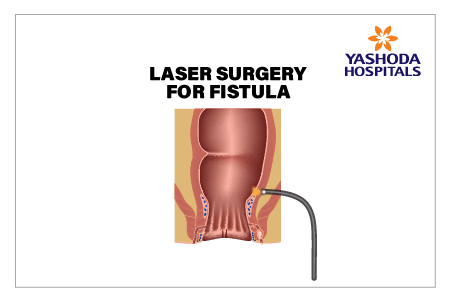Anal Fistula
Its types, causes, symptoms, diagnosis and treatment
Things to know about anal fistula
What is an anal fistula (fistula-in-ano)?
An anorectal fistula is an abnormal connection between the anus and the skin around it. The anus is the external opening of the digestive tract through which the food wastes are expelled from the body. Commonly, an anal fistula arises from an anal abscess, infected cavity filled with pus. A fistula may be present with or without an abscess. While fistulas may not be dangerous, they carry on discharging and cause more painful abscesses.

What are the types of anal fistula?
Based on their location around the sphincter, anal fistulas are classified into:
- Superficial fistula
- Intersphincteric fistula
- Transsphincteric fistula
- Supraspincteric fistula
- Extrasphincteric fistula
What causes an anal fistula?
Around 50% of the anal fistulas arise from an anal abscess. Other causes of anal fistula include:
- Abscess: An abscess constantly gets filled with body fluids such as stool, urine which acts as a breeding site and infective bacteria continues to flourish. Eventually, the abscess breaks through the skin and the organ creating a fistula.
- Crohn’s disease: Among the inflammatory bowel diseases (IBD), fistulas are more common in Crohn’s disease than in ulcerative colitis.
- Sexually transmitted diseases
- Trauma
- Tuberculosis
- Cancer
- Diverticulitis
What are the signs and symptoms of an anal fistula?
- Anorectal pain, swelling, redness & tenderness
- Fever
- Pressure while defecating, cough, sitting
- Constipation or pain associated with bowel movements
- Painful urination
- Foul-smelling discharge from perianal skin
- Sometimes, rectal bleeding
What are the complications of fistula?
A fistula may cause complications such as drainage, sepsis, perforation and peritonitis:
- Fistula drainage and abscess: Fistulas carry on discharging foul-smelling fluid and cause more painful abscesses.
- Sepsis: Sepsis is a life-threatening illness that results from an uncontrolled bacterial infection that spreads throughout the body. Symptoms of sepsis include fever, rashes, chills, confusion, disorientation, rapid breathing and heart rate.
- Perforation
- Peritonitis: Intestinal fistula may cause inflammation or infection of the peritoneum is commonly seen in fistulas.
How are anal fistulas diagnosed?
The physician will carefully evaluate the medical history & anorectal symptoms and perform a rectal examination under anesthesia. Any draining pus (or blood or stool) and heaped up tissue seen in the external opening is related to the anal fistula. When the fistula is not visible on the skin surface, your physician may order an endoscopic ultrasound or MRI to define the fistula tract. Internal fistulas may be evaluated using barium contrast X-ray, MRI or CT scan.
If the anal fistula is suspected to be caused due to digestive diseases such as Crohn’s disease, the patient may need to undergo certain blood tests, X-ray & colonoscopic examination.
How are anal fistulas treated?
Treating anal fistula can get very complicated. Mostly they are treated using medication for pain but eventually, patients almost always need a surgery to cure an anal fistula. Fistula surgery is done as an outpatient procedure. However, very large and deep fistula tunnels may require a short hospital stay.
Treating fistulas in patients with Crohn’s disease: These patients are at increased risk of fecal incontinence, thus the primary treatment involves medication. Surgery is reserved only to treat infection and as a supplement to medication.
Some of the surgical options available for anal fistulas are:

Fistulotomy: Anal fistula involving minimal sphincter muscle is cured by fistulotomy. It has a success rate of 92 – 97%. The surgeon cuts through the skin and muscles over the tunnel to form a groove that heals inside out.
Seton placement & surgery: Complex fistulas are treated with a special drain, seton for at least 6 weeks followed up with a definitive surgical repair. Seton helps to drain the fistula & resolve inflammation in a controlled manner, with minimal pain and normal bowel function.
Laser surgery for Fistula: Laser energy is transmitted by using radial fiber and fistula epithelium is destructed. The procedure may be performed within half an hour via expert surgeon only. An expert surgeon will be able to diagnose the problem and treat the same with great care.
What is the recovery like from surgery for the anal fistula?
It is important to discuss the post-surgery care and recovery. Some pain and discomfort in the area after surgery is common. Most fistulae respond well to surgeries and for easy recovery doctor may recommend:
- Soaking the affected area in a warm bath
- Painkillers
- Laxatives and stool softeners for a week
- Fiber-rich diet
What factors govern the cost of surgery for the anal fistula? Is there an insurance coverage available?
The cost of surgery is governed by several factors, such as
- Availability of skilled and specialized surgeon and facilities
- Medical condition of the patient
- Time-to-recovery
- Usage of medications and additional investigations
Check if the hospital is enrolled with the majority of Third-party Administrator (TPA) and insurers. If you have an insurance policy, seek help from the TPA desk at the hospital to determine whether your policy covers the surgery or not.
References:
- https://inflammatoryboweldisease.net/symptoms/complications/fistula/
- https://www.webmd.com/digestive-disorders/anal-fistula-overview#1
- https://my.clevelandclinic.org/health/diseases/14466-anal-fistula/diagnosis-and-tests
- https://www.verywellhealth.com/what-is-a-fistula-1941776
Disclaimer:
“The content of this publication has been developed by a third party content providerwho are clinicians and/or medical writers and/or experts. The information contained herein is for educational purpose only and we request you to please consult a Registered Medical Practitioner or Doctor before deciding the appropriate diagnosis and treatment plan.”




 Appointment
Appointment Second Opinion
Second Opinion WhatsApp
WhatsApp Call
Call More
More





